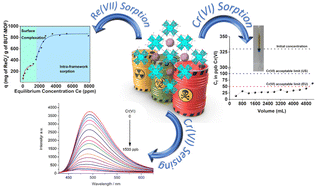Highly efficient sorption and luminescence sensing of oxoanionic species by 8-connected alkyl-amino functionalized Zr4+ MOFs†
Abstract
In the present study we provide the sorption properties of four 8-connected Zr4+ MOFs with the general formula H16[Zr6O16(RNH-BDC)4]·solvent (RNH-BDC2− = 2-alkyl-amine-terephthalate; R = ethyl-, ET-MOF; R = propyl-, PROP-MOF; R = isobutyl-, SBUT-MOF; R = n-butyl, BUT-MOF) towards toxic Cr(VI) and radionuclide-related ReO4− oxoanions. These MOFs represent superior sorbents for the removal of oxoanionic species, in terms of kinetics, sorption isotherms, selectivity and regeneration/reusability. The excellent sorption capability of the MOFs is due to a combination of surface and intra-framework sorption phenomena. The latter process proceeds via replacement of terminal water/hydroxyl ligands from the Zr6 clusters and subsequent binding of oxonanions to the Zr4+ centers, a fact that was proved via Rietveld PXRD analysis for the anion-loaded BUT-MOF. Importantly, BUT-MOF demonstrated an exceptional sorption capacity for Cr2O72− (505 mg g−1) and was further utilized in a sorption column in the form of MOF/calcium alginate beads, displaying remarkable removal efficiency towards industrial (chrome-plating) wastewater. Furthermore, the luminescence Cr(VI) sensing properties of BUT-MOF were explored in detail, presenting high sensitivity (detection limits as low as 9 ppb) and selectivity for these species against various competitive anions.

- This article is part of the themed collection: Spotlight Collection focused on Inorganic Chemistry in Greece


 Please wait while we load your content...
Please wait while we load your content...